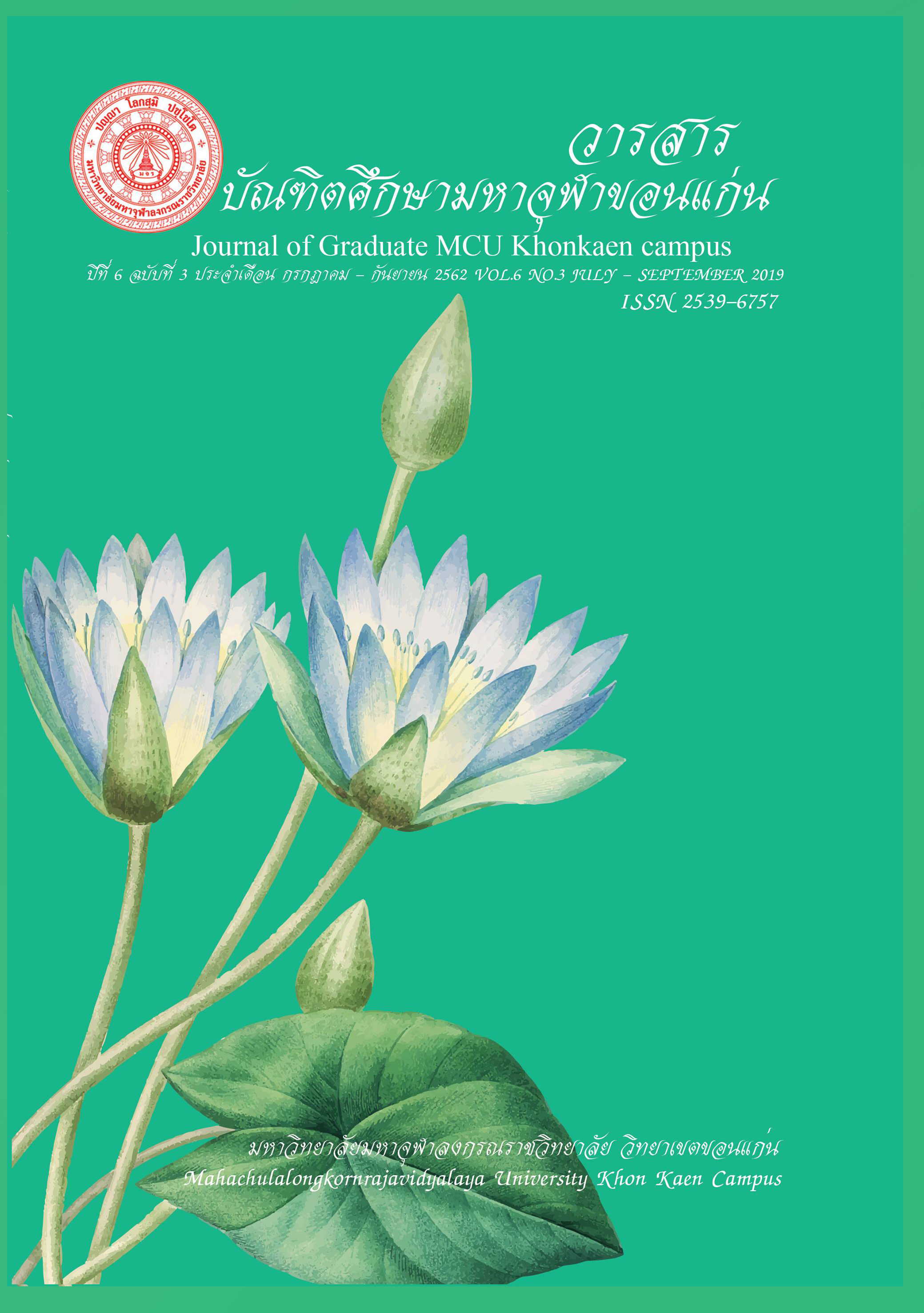ศักยภาพของชุมชนในการพัฒนาความเข้มแข็งเศรษฐกิจฐานรากโดยแนวทางประชารัฐตามหลักปรัชญาเศรษฐกิจพอเพียงแบบมีส่วนร่วมในจังหวัดชัยภูมิ
Main Article Content
บทคัดย่อ
การวิจัยครั้งนี้ มีวัตถุประสงค์เพื่อศึกษาบริบทและสภาพทั่วไปของเศรษฐกิจฐานราก และเพื่อศึกษาศักยภาพของชุมชนในการดำเนินงานการพัฒนาความเข้มแข็งเศรษฐกิจฐานรากโดยแนวทางประชารัฐตามหลักปรัชญาเศรษฐกิจพอเพียงแบบมีส่วนร่วมในจังหวัดชัยภูมิ โดยใช้รูปแบบการวิจัยเชิงคุณภาพ (Qualitative research) เครื่องมือวิจัย ได้แก่ แบบสัมภาษณ์เชิงลึก ผู้ให้ข้อมูลสำคัญ ได้แก่ คณะกรรมการและสมาชิกกองทุนหมู่บ้าน จำนวน 52 คน วิเคราะห์ข้อมูลด้วยวิธีการพรรณนาวิเคราะห์
ผลการศึกษา พบว่า
บริบทและสภาพทั่วไปของเศรษฐกิจฐานรากจังหวัดชัยภูมิ โครงการที่กองทุนหมู่บ้านและชุมชนเมืองจังหวัดชัยภูมิเสนอขออนุมัติเพื่อดำเนินการส่วนใหญ่เป็นโครงการเกี่ยวกับการบริหารจัดการด้านการเกษตร ปุ๋ย ยา เมล็ดพันธุ์ คิดเป็นร้อยละ 42.40 โครงการลักษณะการบริหารงานชุมชน คิดเป็นร้อยละ 19.57 และโครงการลักษณะร้านค้าชุมชน คิดเป็นร้อยละ 7.18 ตามลำดับ ศักยภาพของชุมชนในการดำเนินงานการพัฒนาความเข้มแข็งเศรษฐกิจฐานรากโดยแนวทางประชารัฐตามหลักปรัชญาเศรษฐกิจพอเพียงแบบมีส่วนร่วม 1) ด้านศักยภาพของชุมชน คนในชุมชนมีรู้ที่หลากหลายเกิดจาการสั่งสมประสบการณ์ของแต่ละคนและคนในชุมชนมีการแลกเปลี่ยนเรียนรู้ระหว่างกันจากการลงมือปฏิบัติร่วมกันและนำผลที่ได้นั้นมาเป็นบทเรียนและองค์ความรู้ของชุมชนในการแก้ไขปัญหาต่างๆ เพื่อสนองตอบความต้องการของภายในชุมชน 2) ศักยภาพและบทบาทของกองทุนในการพัฒนาศักยภาพเศรษฐกิจฐานราก (1) คณะกรรมการกองทุนจะยึดหลักคุณธรรม 5 ประการ คือ ความซื่อสัตย์ต่อกัน ความไว้วางใจต่อกัน ความเสียสละเพื่อส่วนรวม ความรับผิดชอบร่วมกัน และมีความเห็นอกเห็นใจซึ่งกันและกัน (2) ด้านความรู้ คณะกรรมการกองทุนได้รับการอบรมหรือศึกษาดูงานเกี่ยวกับการบริหารจัดการกองทุน (3) ด้านการบริหารจัดการมีการแต่งตั้งคณะกรรมการ 4 คณะในการบริหารจัดการ และได้แต่งตั้งอาสาประชารัฐ ทำหน้าที่ติดตาม ตรวจสอบการดำเนินงานและรายงานผลการดำเนินโครงการให้หน่วยงานที่เกี่ยวข้องได้รับทราบ
Article Details
เอกสารอ้างอิง
Community University Laboratory. Banpu Heal Spa Resort. 6
September. Chon Buri, Burapa University.
Sornphaisan. (2017). Pracharat for the people and for the state. Manager Online.
Search 9 June 2017. Form https://mgronline.com/mualfund/detail/9580000106890.
Chantavanich, S. (2003). Analysis in qualitative research, ed. 5 st ed.
Bangkok. : Chulalongkorn University.
Buasai, K., et al. (2017). The Administration Project of the Agricultural Civil by
Village Fundsin Khon Sawan District, Chaiyaphum Province.
Khon Kaen Agr J. 45 suppl. 1.
Muangyai, A. (2016). Development Approach to Enhancing the Potential of
Community and Local in the Twenty-First Century. Eau
Heritage Journal Social Science and Humanity, Vol.6 No. 3 September-December 2016, p. 12-26.
Charin Mangkhang (2016). Community Potentials and Citizen Participation
in Ecotourism Management towards Learning Resources on
Community Enterprise of Ban Mea Kam Pong, Chiang Mai. MFU
Connexion: Journal of Humanities and Social Sciences, Vol. 6 No.
2, P. 265-294.
Natchapakpraphob, C., et al. (2015). The Guidelines for Sustainable
Administration of Nation Village and urban Community fund : A
Case study of Phetchabun Province, Thailand. Journal of Modern
Management, Vol. 13 No. 2, P. 93-101.

